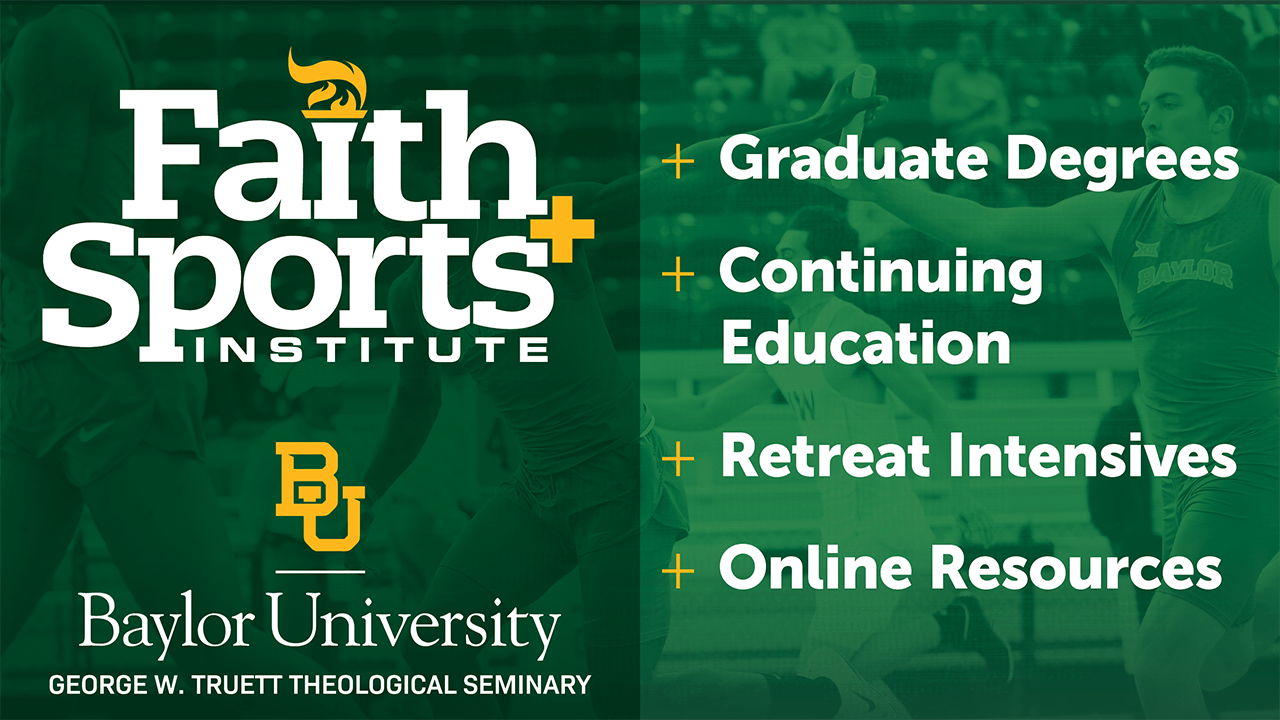
Isaac Lee
Who or what am I worshipping when I engage in sports?
If we think about it, we’ll realize that sometimes we’re worshipping the wrong things—that we are turning sports into an idol that directs our hearts away from God. This might be evident in the glorification of star athletes, the pursuit of youth sports glory at the cost of regular church attendance, or the belief that winning on the scoreboard is the most important thing in life.
But there are other possibilities, too. When I was a staff member with Athletes in Action Canada, we would put on an annual National Training Camp to help athletes understand how to worship God in their sport. One year we held the camp in Edmonton and we booked Commonwealth Stadium for our athletes. Built like an ancient stadia, this beautiful venue was used for Canadian football, track and field, and a number of FIFA events. It was the perfect place to consider the words of Hebrews 11-12: “Therefore, since we are surrounded by such a great cloud of witnesses, let us throw off everything that hinders and the sin that so easily entangles. And let us run with perseverance the race marked out for us, fixing our eyes on Jesus, the pioneer and perfecter of faith.”
While standing at center field, we invited athletes to look up at the stands and to imagine it was filled with brothers and sisters in Christ, saints from the past and present, cheering us on to the finish line. We invited them to hear the encouragement of the crowd ringing in their ears, urging them to “fix your eyes on Jesus!” as they competed. We asked them to turn their attention from worshiping self and seeking the adoration of fans, and instead to focus on worshiping God with their whole bodies on the field of play.
When I think back to that moment, I am reminded of the beautiful spiritual transformation that occurs as athletes learn how to worship God through their sport. They discover new joys, new possibilities, new connections with the God who created them to play and compete. Their imaginations are sparked, leading them to a more holistic view of Christian worship and a discovery that God wants to meet them on the sports field and in all their athletic pursuits.
As I’ve continued my journey in sports ministry—now serving in a role with the Faith & Sports Institute—the idea of worship in sports continues to draw my interest. At the same time, I’ve realized that the practices and teachings we developed at AIA are part of a larger theological conversation about worship and sports.
Below, I’d like to offer key insights from three books that are part of that conversation. While we must always be aware of the danger of idolatry, these books have confirmed my deep belief that God has more for sports, and that we should embrace the opportunity to meet with God in the field of play.
Worship and Flow
Robert Ellis, author of The Games People Play: Theology, Religion, and Sport, writes about the transcendent nature of sports. He draws on the works of Michael Murphy and Rhea White, where they describe transcendence as “moments of illumination, out-of-body experiences, altered perceptions of time and space, exceptional feats of strength and endurance states of ecstasy.” Ellis also finds inspiration from Mihaly Csikszentmihalyi’s understanding of “flow,” where “people are so involved in an activity that nothing else seems to matter; the experience itself is so enjoyable that people will do it even at great costs, for the sheer sake of doing it.”
Sports offers tremendous opportunities to experience this sense of flow. Have you ever felt those moments when body, mind and soul are working in unison? There can be this euphoric experience when you leap to catch a ball, make an unbelievable pass, or sprint down a track.
Could this greatness be an encounter with the divine, the one who created everything that has to do with sports?
Ellis also has a second idea when it comes to transcendence in sports. It is not just about a powerful moment or experience, but also about a desire and hunger to reach beyond ourselves, to develop our full potential.
“This human restlessness, this striving for better, is ultimately a striving after God,” Ellis writes. And it is made possible “because of God’s striving and reaching for us.”
A foundation for understanding sports and worship, I believe, is to see sports as a place where human beings reach for God. If God is omnipresent surely he can meet us in sports as much as he wants to meet us in church on Sundays.
Bodies Matter
Erik Dailey, author of The Fit Shall Inherit the Earth: A Theology of Sport and Fitness, engages with and expands on the work of Ellis. He highlights the fact that sports are a fully embodied activity, and that full embodiment reflects who we have been created to be. Sports, according to Dailey, are “an excellent means for reclaiming the understanding of the unified person.”
“Reclaiming” is a powerful statement. So what does it mean?
For Dailey, it’s about combatting a dualistic view of the body that has often led Christians astray. Dualism is not a new concept. As Dailey writes, it can be traced back to ancient Greek philosophies, and it’s defined by “the belief that the human person is made up of distinct and possibly separable parts: the mind—or in spiritual terms, the soul—and the physical body.”
Christians shaped by dualism have tended to diminish the value of the physical body, elevating the significance of the mind or soul (the inner realm) as the part of our selves that truly matters. This ultimately denies and distorts the goodness of God’s creation.
Sports, because it is an intensively physical activity, can help correct this error. When we engage in sports, Dailey suggests, we bring our whole selves—mind, body, soul, spirit—to the task. We participate in an activity that reminds us of the gift of our embodiment.
Sports as an embodied experience speaks the language of scripture as well. Mark 12:30 commands us to “love the Lord your God with all your heart and with all your soul and with all your mind and with all your strength.” Romans 12:1, a popular verse within sports ministries, states: “Therefore, I urge you, brothers and sisters, in view of God’s mercy, to offer your bodies as a living sacrifice, holy and pleasing to God—this is your true and proper worship.”
Worship is not simply an emotional state, a powerful experience, or an intellectual activity. It is an invitation to offer our whole selves to God. Sports can remind us of this and provide us with a powerful opportunity to worship with mind, body, and soul.
Practicing Worship
In their book On the 8th Day: A Catholic Theology of Sports, Matt Hoven, J.J. Carney, and Max Engel help us understand worship and sports from a different angle. Drawing on the Catholic tradition, they emphasize the sacramental nature of sports. They write: “To the extent that sports awaken, remind, and sustain awareness of God’s presence, they can ‘prepare us to receive grace and dispose us to cooperate with it’ and so be sacramental encounters.”
There are two important steps to this process. First is recognition. “All experiences in sports and life offer profound opportunities to reflect on God’s presence,” they write. But after recognition must come reflection; we must “interpret what these experiences mean.”
Two athletes, both of them Christian, can compete on the same field for the same team. But they will not automatically have the same experience or encounter with God on the field. One can go the whole game without a thought of God at all; the other could participate with a heart fully aware of God’s presence.
This gets to another key point: a lifestyle of worship takes practice. “Learning to see sports and the world from a sacramental perspective,” the authors write, “is a spiritual habit that takes training and practice, something athletes are familiar with.”
This is a profound statement when we think about sports and worship. It reminds us that, even if God’s presence is already available when we compete, we are invited to acknowledge and receive it. And to do that, we need to practice and prepare. We need to train spiritually.
Moving Forward
As I’ve spent time considering the work of these sports theologians, I am convinced that sports can and should be a place of Christian worship. It does not replace the need to gather with fellow believers weekly to worship God; instead, it offers an opportunity to be a “sent” people, where our worship infuses our everyday experiences in both work and play.
I also believe there is great potential for holy creativity. I believe we can re-imagine new ways to practice worship—and, in so doing, to engage in the process of spiritual formation.
We cannot go from zero to one hundred in terms of applying spiritual practices to competitive environments. We need to first shape our bodies, minds, and souls in the training rooms, nutrition centers, ice baths, and therapy rooms. We need to learn how we can glorify God in the day-to-day before we are tested in the field of play. We need to experience God in the mundane and not just in the mountain top encounters.
In so doing, we can begin to see and experience sports as a place of worship, where we invite the common practices of faith to be interwoven into embodied experience as we run, jump, throw, dive, swim, skate, and compete.
Isaac Lee serves as Continuing Education Program Manager for the Faith & Sports Institute. If you’d like to reflect more on the connections between worship, sports, and spiritual formation, check out FSI’s Online Certificate Program. This fall, a new course on Sports and Spiritual Formation is being offered: https://truettseminary.baylor.edu/programs-centers/faith-sports-institute/fsi-online-certificate-program





